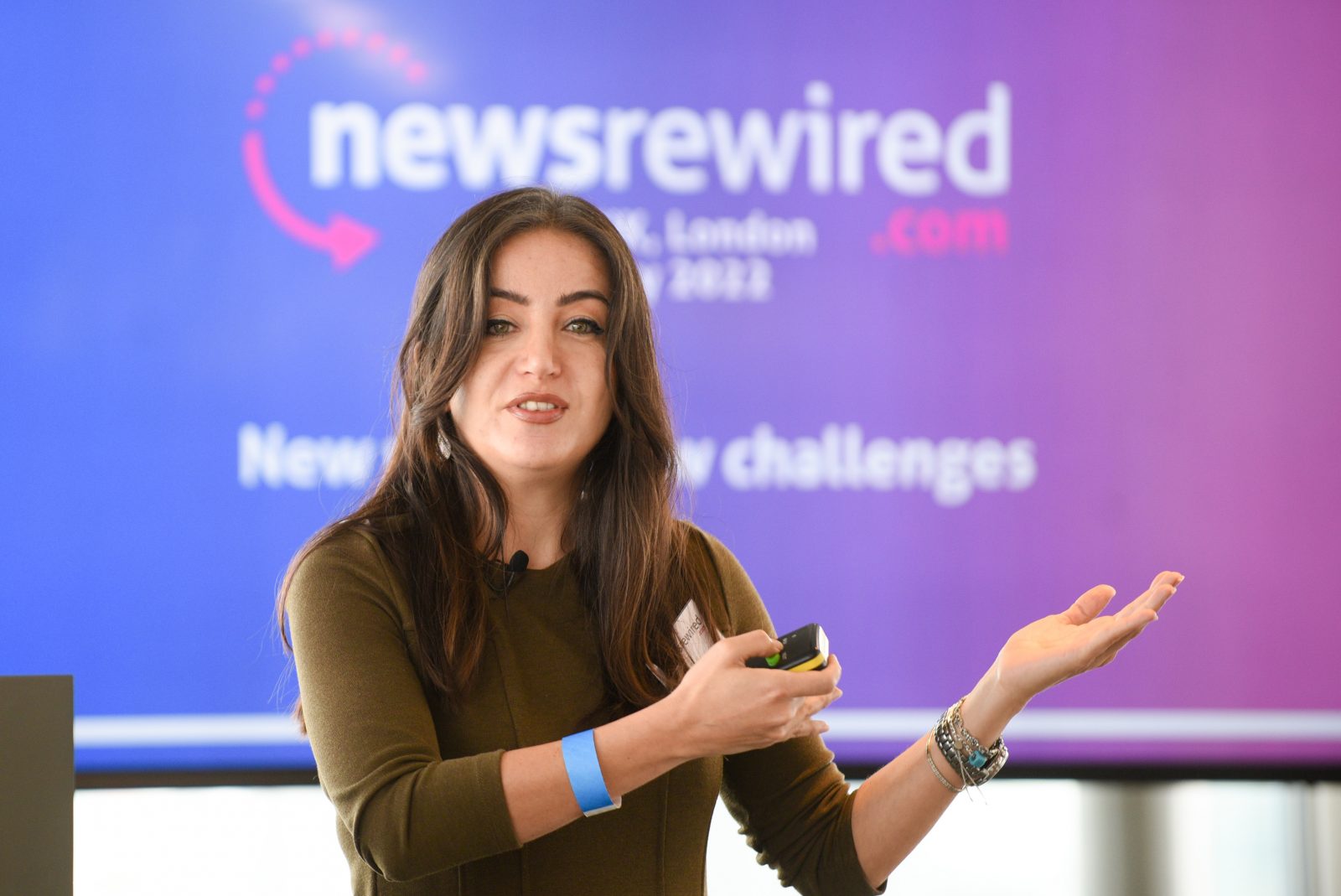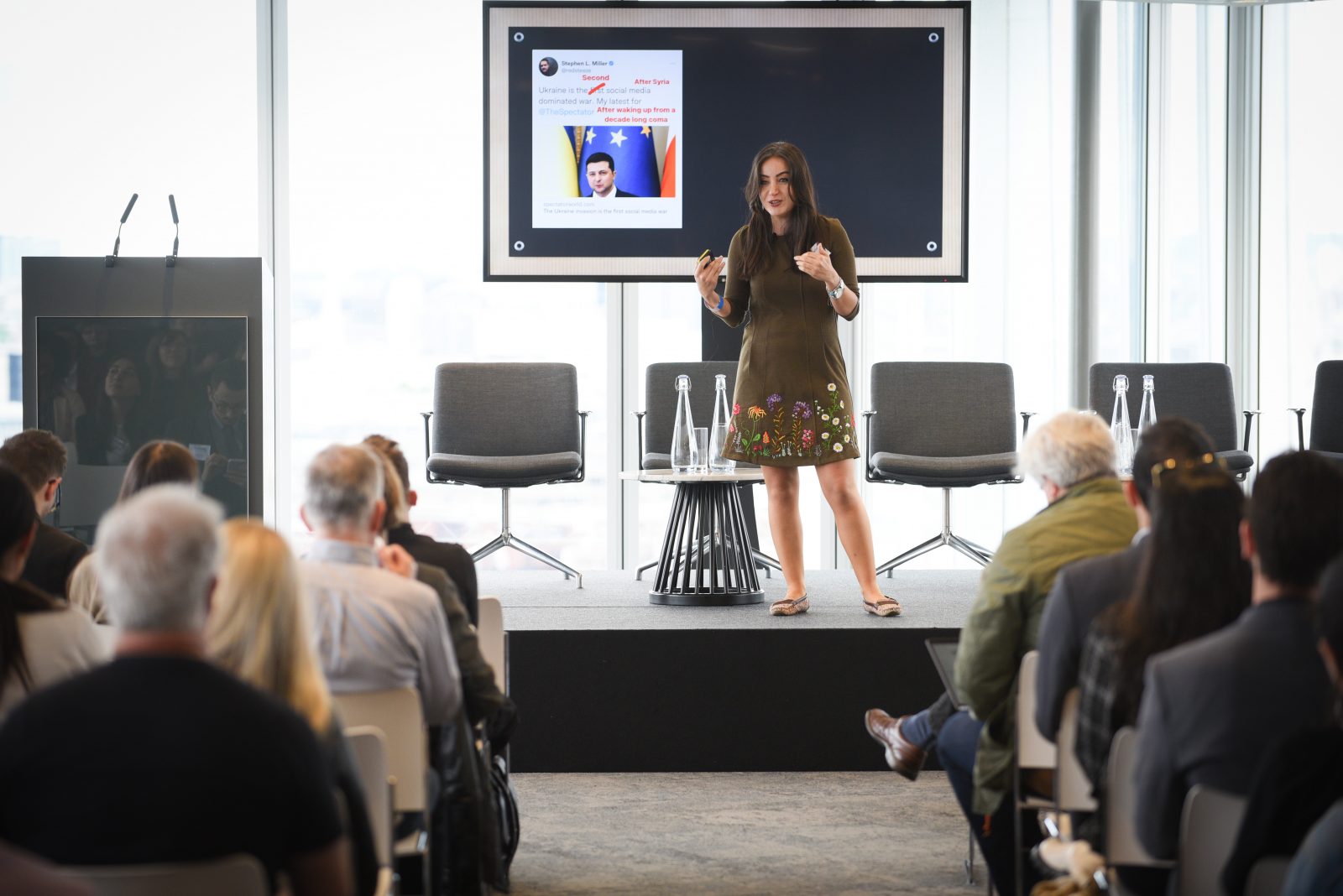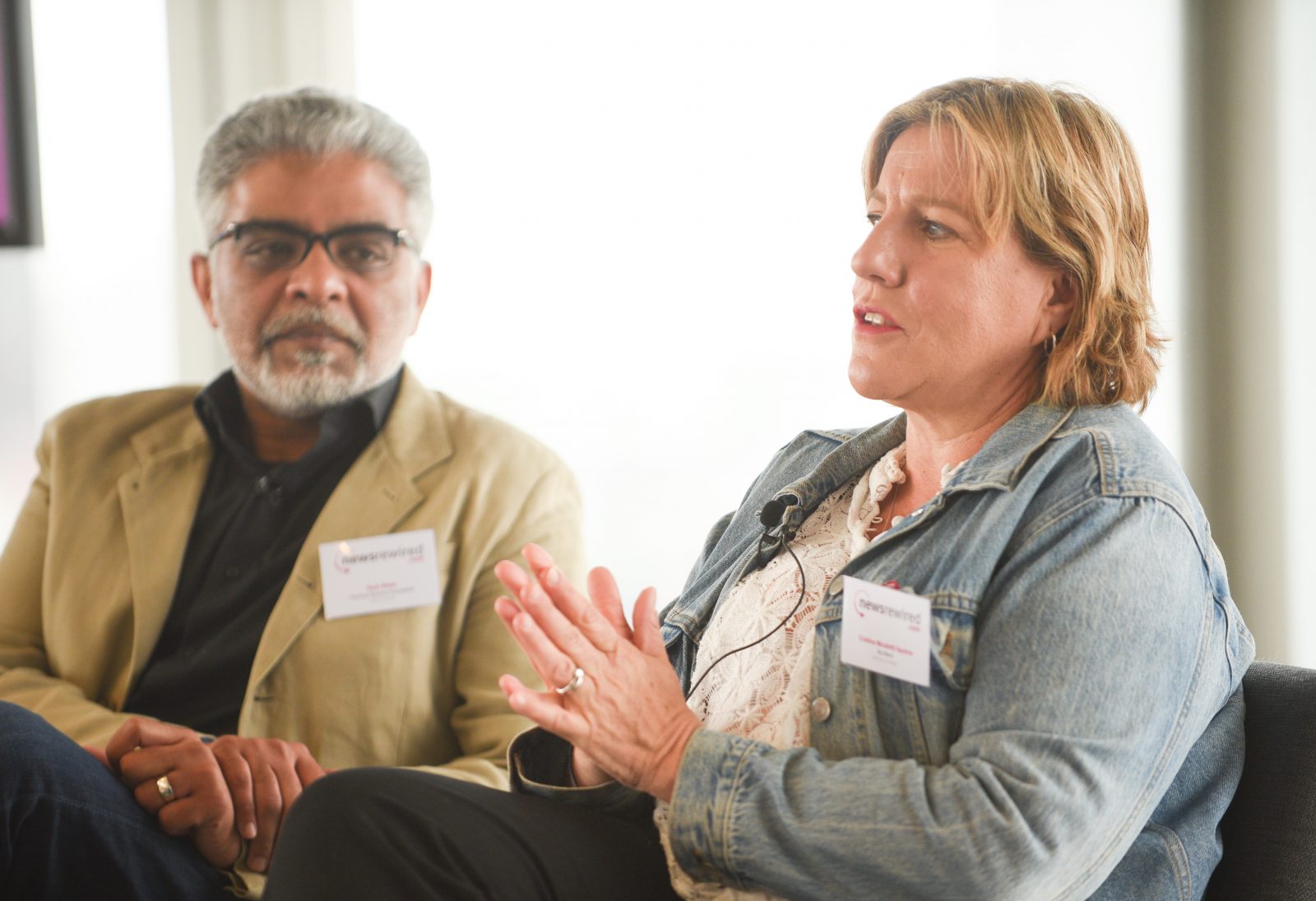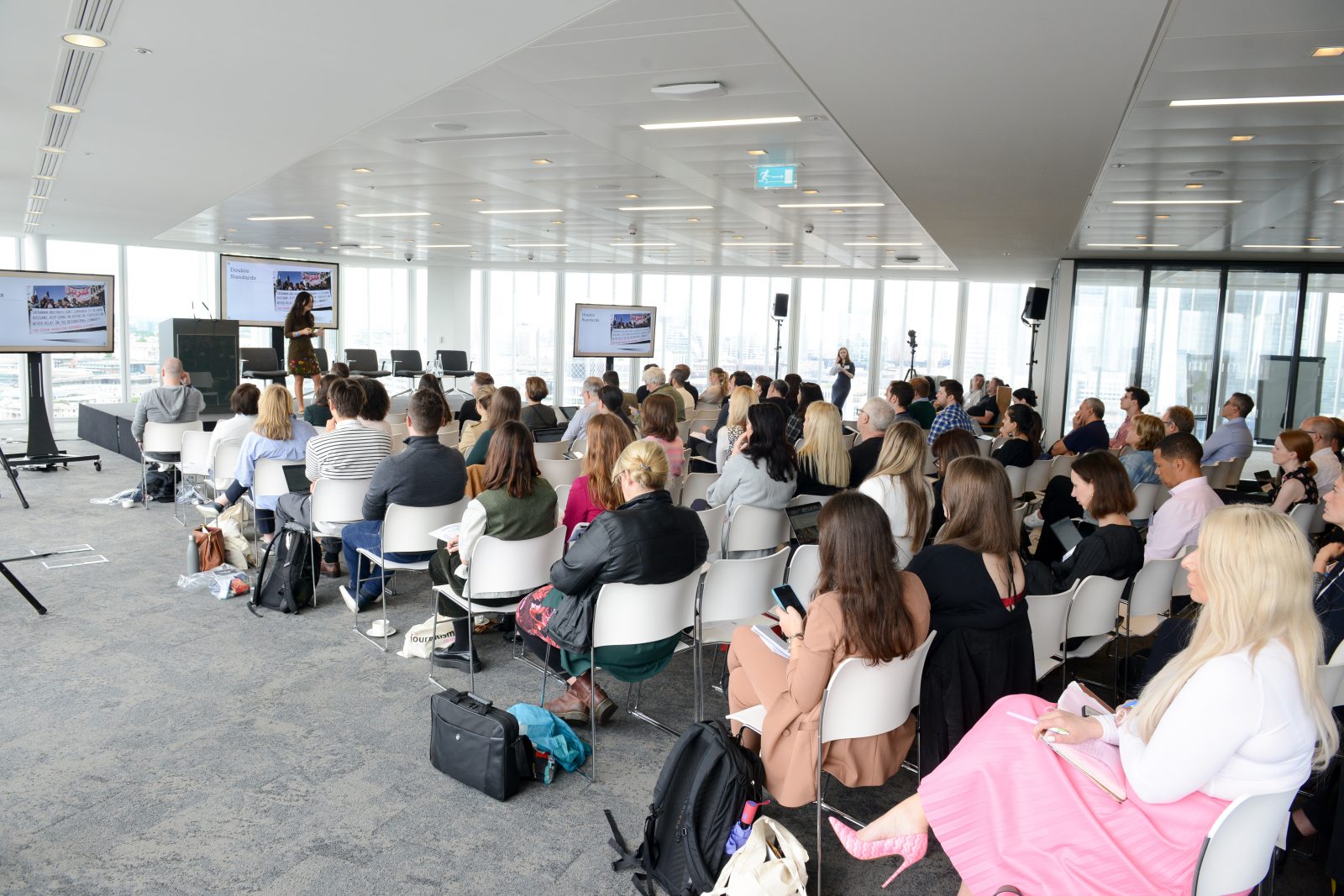Journalism.co.uk event shines light on post-pandemic news media atop the News UK tower
The second quarter of the year has seen a welcome return to real-life events in real-life settings, and this week in London the news sector was in full focus at Journalism.co.uk’s latest Newsrewired event. This week celebrating it’s 30th incarnation, the event provided leading insights from industry-leading speakers from brands such as The Telegraph, Guardian, Sky News, The Economist and more, and we look at some of the key themes from the event here…
The role of the journalist in a polarised world
The proceedings kicked-off with a candid keynote speech by Zaina Erhaim, a Syrian journalist and activist who has worked with the BBC, Alhayat, Orient TV, the Guardian, the Economist, and Die Zeit, and won multiple international awards for her work on conflict reporting and training citizen reporters.
Erhaim highlighted the scepticism that still surrounds local journalists today, while reminding us that ‘editorial balance’ is not about inviting a moon landing denier onto debate Neil Armstrong.

“Wherever you go you hear the fact that local journalists cannot be objective, but in my opinion that a myth. Conversely there’s also an assumption that any ‘international’ journalist is automatically objective, regardless of where they come from or what they are covering.”
“We also have huge issues with the meaning of objectivity in our industry today. If we want to be fair, and we are investigating a dictator who turns out to be a criminal figure, then attempting to create a false balance is unhelpful. If we want to be fair, we should not give the exact same mic with the exact same volume to someone who can shout loudly vs someone who has no voice at all.”
One thing that some may be aware of, and others less so, is the western bias that can still dominate the global news cycles today. As someone who has been all too familiar with war throughout their entire life, Erhaim provided her own perspective about just how quickly – and sensationally – the war in Ukraine was reported.
“There has been a lot of talk about Ukraine bring the first social media war, but Syria was in fact this, and it just wasn’t publicised. For me, there is no other justification other than we are maybe not quite white enough – Ukraine is given priority, and nothing else matters. The idea of ‘distance’ didn’t actually matter when the Ukraine war came along. Some people said that the increased coverage was because it was closer to Europe, but in the US and Canada too, coverage has been in-depth.”

The reporter also emphasised some of the unique challenges facing local reporters covering the ‘global south’, and provided her top ten pieces of advice both for those journalists, and those working with them:
- Local journalists are not your free of charge fixers, if sources, expertise & information is needed, include their names in the bylines.
- The security of the locals is more important than any story.
- Listen o the locals and don’t enforce your own perspectives on them.
- Ask the people you interview/work with ‘How are you’ (and before getting their quotes)
- Your translator and interviewees might be at risk from working with you. Be considerate.
- You are NOT the story.
- People don’t need journalists to be ‘their voice’. They need fair representation.
- Help local journalists in pitching their stories, instead of quoting them in your own piece.
- Invest in local journalists’ development, they’ll pass it over.
- Remember that local journalists & the people ARE the experts. So treat them as such.
Resilience: ‘capacity to recover quickly from difficulties; toughness’ (Oxford via Google)
One fascinating panel at the event came in the form of a session on resilience in the newsroom, featuring speakers from Sky News, Thomson Reuters, The Reuters Institute, and industry-veteran and now independent consultant, John Crowley.
Between them, the panel explored not only why resilience in the newsroom is important, but also how our definition and even application of what resilience actually is has changed considerably in recent years. Where this was once felt to be a stoic quality, embodying the British ‘stiff upper lip’, resilience has now come to represent a much more open, modern approach to emotional intelligence and psychological stamina in working environments.

“The last two years of pandemic has affected all of us in one way or another, said John Crowley, Editor, Consultant, and co-Founder of Headlines Network. “We need to acknowledge that journalists aren’t robots, they need protection and training. It’s also important that social or psychological health issues don’t simply just get tossed over to HR – managers in the newsroom also need to take responsibility and help their staff, as well of course as receiving help themselves when they need it.”
“And there’s talking the talk, but we also need to walk the walk, and there’s a lot of places where bad habits still haven’t hanged in my view, possibly because there just isn’t a desire for change. It is another plate for people to have to spin looking after each other, in there already busy days, but it needs to be an integral part of everyone’s focus in the working environment.”
Meera Selva, Deputy Director at The Reuters Institute, reiterated the need for greater psychological wellbeing awareness.
“We did some research right at start of pandemic where we spoke to large international organisations, just to get an overview of how people were feeling. Journalists were showing signs of PTSD, depression, anxiety, and it was akin really to people who we might have seen come back from reporting on warzones. In particular, we saw this issue of moral injury… that i.e. people were reporting on something that they couldn’t help with.”
“Women in particular were strongly affected, because they already had multiple roles around the household, and now suddenly within the Zoom workplace were often the ones being called upon to be mentors, supporters, and the providers of additional social interactions.”
For Yasir Khan, Editor-in-Chief for the Thomson Reuters Foundation, the pandemic was a time when we learned what strong newsrooms were truly made of.
“Good newsrooms are cultures of conversation,” he said. It’s that conversation that builds and makes you feel like there’s a group of people around you that are in the same boat. But during the pandemic, that rug was yanked from under our feet, and you suddenly had to make an appointment and sit at the screen just to have a conversation. Every conversation was by default deliberate, and that really did a number on our mental health.”
“My job became to have cold conversations with people, not just about work but their wider life and well-being as well, or even go for a walk with people if they lived nearby. Extroverts you can get to talk quite easily, but introverts are another story. And we were just not equipped to deal with this level of trauma. All of a sudden, we were all simultaneously in a warzone, recession, major apocalyptic event, with no idea how to deal with it.”

Cristina Nicolotti Squires, Director of Content for Sky News, summed up the industry’s changing attitude towards resilience succinctly:
“Since I entered the profession, I’d like to think the world has changed. There are undoubtedly more women in positions of power at news organisations now, and when it comes to resilience that can help. Because originally, ideas around emotional intelligence and mental wellbeing and so on would often be brushed aside as ‘women’s things’. Well now, women have gone more mainstream in the industry and so too as a resuly have these issues, which can only be a good thing.”
Elsewhere on the agenda…
The entire programme was packed full of in-depth insights on topics across platforms and publishers, changing revenue models and newsletters (the latter of which we’ll take a separate in-depth look at later on this week).
A key area of interest for FIPP in recent years has been on BIG tech regulation, and just how the global industry can get a fix on global platforms, especially when independent national governments appear to be approaching these issues in different ways.

At Newsrewired, Lexie Kirkconnell-Kawana, Head of Regulation at Impress, got to the heart of the matter.
“I think the fact is reg is coming. For a long time, private companies felt like they could do anything that they wanted in this space, and it’s right that they ultimately come under some sort of third-party control. But is it adequate for bodies such as Ofcom to be making these sorts of decisions? With no public mandate? And how is the journalism sector going to respond, where issues around free press and free speech come into play?”
“Regulation must come, but it must be the right type of regulation. And we must look t ways that platforms and publishers can come together for the good of the industry. There are great ways that journalism can support platforms so they can grow and develop, and vice versa.”
The event at large was hugely positive – and lively – bringing key perspectives from the news sector of the media industry, and indeed different perspectives on different areas of that sector.
At one point during the platform-publisher debate, a guy got up to ask a question – and I’m paraphrasing here, because I can’t recall exactly who it was or which organisation he was with – but effectively just said: What!? platforms paying publishers for THEIR content!? You’re having a laugh aren’t you! All they do us put a thumbnail and a bit of blurb up, and from that you get like well increased traffic!
(It wasn’t me by the way). But a wonderful event in a wonderful setting, that provided a good temperature check of where the UK (and international industry) is up to as we put the pandemic era behind us. Can’t wait for the next one!
All images here courtesy of Mark Hakansson/Mousetrap Media, and you can find out more about Journalism.co.uk’s Newsrewired here.








